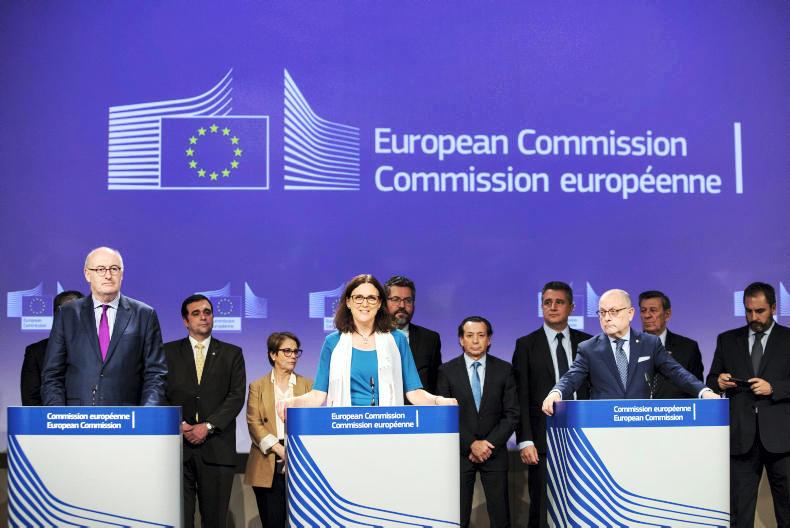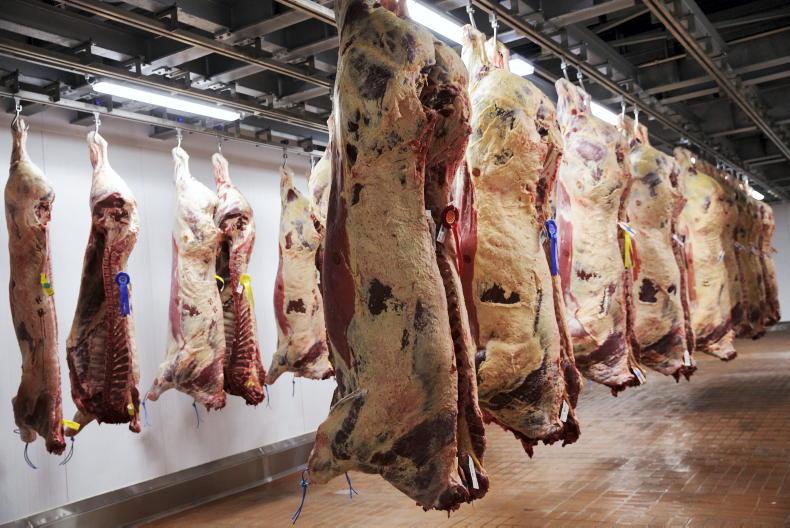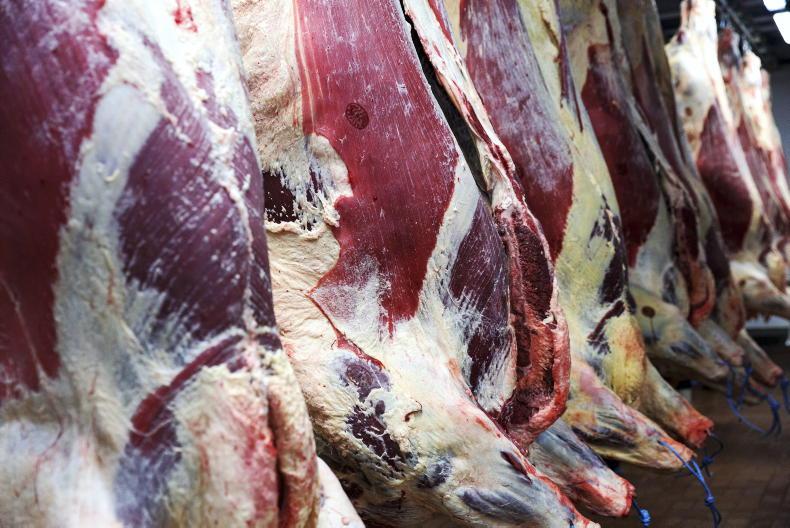Irish and EU beef farmers have had a prolonged period of depressed farmgate prices and neither the effect of Brexit nor the Mercosur trade deal have yet to be experienced.
Two separate reports released this week reinforce the opportunities that await in a Mercosur deal, but, unfortunately, at the expense of beef producers.
Quarterly review
In Ireland, the Central Bank issued its first quarterly review of 2020. These reports are an overall assessment of economic performance, but this report highlighted the strong performance of exports where 10.9% growth was achieved.
However, there were just two main drivers of this, with other sectors either flat or slightly negative.
The biggest contributor to Irish exports is the pharmaceutical sector, based on several multinational companies producing high-value drugs that are in demand across the world.
The other category is in technology, with the global giants of Apple, Google and Microsoft all huge contributors.
What has this got to do with farming?
Pharmaceuticals, chemical and machines, including office technology and equipment, are all major winners in a Mercosur trade deal and have considerable further growth potential if import tariffs by Mercosur countries are removed.
Irish pharmaceutical exports were estimated by the Central Bank at €150bn in 2019 and sales to Mercosur were €314m according to the EU Commission DG Trade.
It is clear that with tariffs eliminated there is considerable growth potential
These currently carry an import tariff of 14%, but if the Mercosur trade deal is approved, this would be removed.
It is the same, though on a smaller scale, with machinery and office equipment, which carry tariffs at present between 14% and 20%. Currently, Irish exports to Mercosur paying these tariffs amount to €111m. It is clear that with tariffs eliminated there is considerable growth potential for these sectors to grow their business significantly.
They are also the dominant export sectors of the Irish economy at present and it is clear how farmers in the beef sector could be sacrificed.
Why is it such a problem for beef?
EU demands on farmers for traceability, welfare and environmental controls make beef production in the EU among the most costly in the world.
Additionally, South America enjoys additional climatic advantages over huge areas, meaning that they have a much lower cost production model.
The withdrawal of direct coupled support ... undermines Irish and EU beef farmers
This didn’t matter so much when the EU had a restricted access approach to imports and were prepared to pay adequate direct support to farmers for production that was done in the way the EU wanted.
The withdrawal of direct coupled support, reduced financial commitment to the CAP since 2005 and an open trade policy totally undermines Irish and EU beef farmers.
Other sectors, such as dairy and pigmeat, are more globally competitive, while the EU has a deficit in sheepmeat production.
Access for a further 99,000t of beef at a 7.5% tariff plus the elimination of the 20% tariff on the Hilton Quota, to coincide with the UK having a unilateral trade policy, could be a fatal blow to specialised beef production in Ireland and the EU.
Beef is more complicated than it appears
Beef is an umbrella term that is given to a multitude of component parts that are taken from a beef animal in processing and sold separately in whatever global market that values the particular cut of beef the most.
The EU is traditionally a high-value market for steakmeat, while the USA and, more recently, China place a huge value, more than the EU in some cases, on forequarter meat.
This meant that in late 2019, as demand accelerated in China for the cuts they prefer, the big South American exporters who supply three-quarters of China’s beef imports were selling rump and loin to the EU at almost half the price they were getting five years ago. Unfortunately, carcase balance hasn’t featured in the Mercosur agreement that was announced in June 2019.
What can farmers do?
Farmers will lobby intensively against the ratification of the Mercosur trade deal, but the major car manufacturing countries are pushing hard for the deal.
Even Ireland, with its huge pharmaceutical industry, will be difficult to persuade to oppose the deal. A billion euro fund is promised, but after the difficulties with the €100m Brexit compensation fund, this will make farmers wary about terms and conditions being attached.
This enables the EU to control imports if it can demonstrate that the market is being undermined
What might be worth exploring if the deal comes to pass is the safeguard clause. This enables the EU to control imports if it can demonstrate that the market is being undermined.
It is used effectively in Japan in trade deals where it has granted a quota for imports of agricultural products.
At times, Irish butter imports are switched off if the domestic market has dropped to a low value. In an EU situation, where beef imports for rump and loin are a fraction of a previously value, this might be an occasion in which the safeguard mechanism might be used.
Ideally, farmers would prefer governments to reject the deal, but if that fails it is important to get a compensation package that is workable and a proper safeguard mechanism that preserves market value for all types of beef.
Read more
Mercosur deal is a fair one for European farmers
Irish and EU beef farmers have had a prolonged period of depressed farmgate prices and neither the effect of Brexit nor the Mercosur trade deal have yet to be experienced.
Two separate reports released this week reinforce the opportunities that await in a Mercosur deal, but, unfortunately, at the expense of beef producers.
Quarterly review
In Ireland, the Central Bank issued its first quarterly review of 2020. These reports are an overall assessment of economic performance, but this report highlighted the strong performance of exports where 10.9% growth was achieved.
However, there were just two main drivers of this, with other sectors either flat or slightly negative.
The biggest contributor to Irish exports is the pharmaceutical sector, based on several multinational companies producing high-value drugs that are in demand across the world.
The other category is in technology, with the global giants of Apple, Google and Microsoft all huge contributors.
What has this got to do with farming?
Pharmaceuticals, chemical and machines, including office technology and equipment, are all major winners in a Mercosur trade deal and have considerable further growth potential if import tariffs by Mercosur countries are removed.
Irish pharmaceutical exports were estimated by the Central Bank at €150bn in 2019 and sales to Mercosur were €314m according to the EU Commission DG Trade.
It is clear that with tariffs eliminated there is considerable growth potential
These currently carry an import tariff of 14%, but if the Mercosur trade deal is approved, this would be removed.
It is the same, though on a smaller scale, with machinery and office equipment, which carry tariffs at present between 14% and 20%. Currently, Irish exports to Mercosur paying these tariffs amount to €111m. It is clear that with tariffs eliminated there is considerable growth potential for these sectors to grow their business significantly.
They are also the dominant export sectors of the Irish economy at present and it is clear how farmers in the beef sector could be sacrificed.
Why is it such a problem for beef?
EU demands on farmers for traceability, welfare and environmental controls make beef production in the EU among the most costly in the world.
Additionally, South America enjoys additional climatic advantages over huge areas, meaning that they have a much lower cost production model.
The withdrawal of direct coupled support ... undermines Irish and EU beef farmers
This didn’t matter so much when the EU had a restricted access approach to imports and were prepared to pay adequate direct support to farmers for production that was done in the way the EU wanted.
The withdrawal of direct coupled support, reduced financial commitment to the CAP since 2005 and an open trade policy totally undermines Irish and EU beef farmers.
Other sectors, such as dairy and pigmeat, are more globally competitive, while the EU has a deficit in sheepmeat production.
Access for a further 99,000t of beef at a 7.5% tariff plus the elimination of the 20% tariff on the Hilton Quota, to coincide with the UK having a unilateral trade policy, could be a fatal blow to specialised beef production in Ireland and the EU.
Beef is more complicated than it appears
Beef is an umbrella term that is given to a multitude of component parts that are taken from a beef animal in processing and sold separately in whatever global market that values the particular cut of beef the most.
The EU is traditionally a high-value market for steakmeat, while the USA and, more recently, China place a huge value, more than the EU in some cases, on forequarter meat.
This meant that in late 2019, as demand accelerated in China for the cuts they prefer, the big South American exporters who supply three-quarters of China’s beef imports were selling rump and loin to the EU at almost half the price they were getting five years ago. Unfortunately, carcase balance hasn’t featured in the Mercosur agreement that was announced in June 2019.
What can farmers do?
Farmers will lobby intensively against the ratification of the Mercosur trade deal, but the major car manufacturing countries are pushing hard for the deal.
Even Ireland, with its huge pharmaceutical industry, will be difficult to persuade to oppose the deal. A billion euro fund is promised, but after the difficulties with the €100m Brexit compensation fund, this will make farmers wary about terms and conditions being attached.
This enables the EU to control imports if it can demonstrate that the market is being undermined
What might be worth exploring if the deal comes to pass is the safeguard clause. This enables the EU to control imports if it can demonstrate that the market is being undermined.
It is used effectively in Japan in trade deals where it has granted a quota for imports of agricultural products.
At times, Irish butter imports are switched off if the domestic market has dropped to a low value. In an EU situation, where beef imports for rump and loin are a fraction of a previously value, this might be an occasion in which the safeguard mechanism might be used.
Ideally, farmers would prefer governments to reject the deal, but if that fails it is important to get a compensation package that is workable and a proper safeguard mechanism that preserves market value for all types of beef.
Read more
Mercosur deal is a fair one for European farmers










SHARING OPTIONS